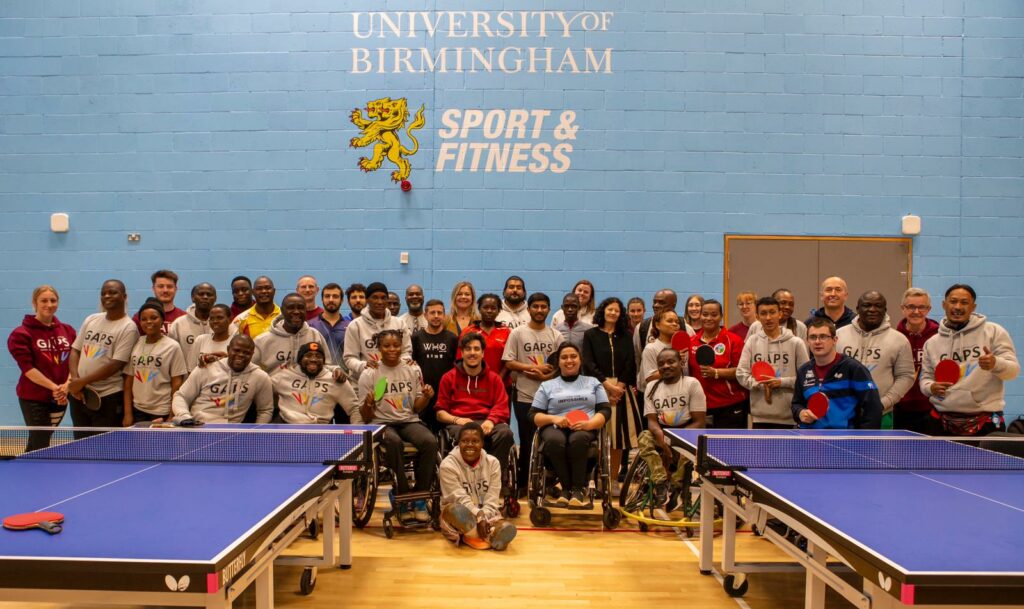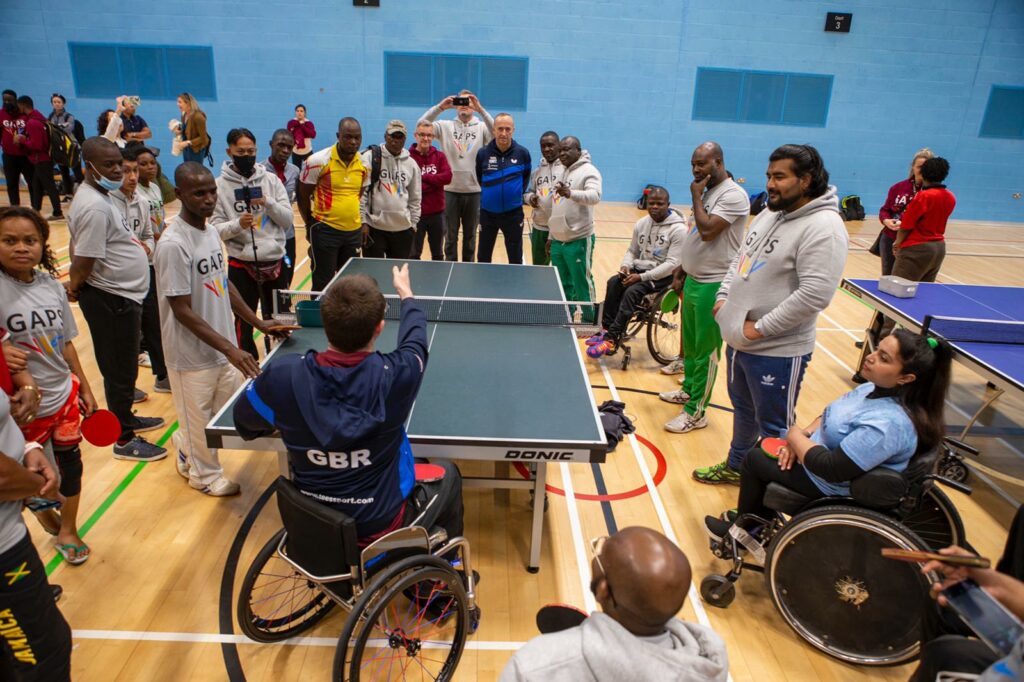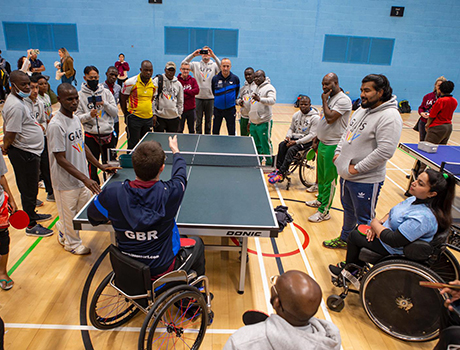British para athlete and coach Dan Bullen led an inspirational training camp for athletes and coaches from a number of Commonwealth countries under the GAPS programme.
Those participating in the camp at the University of Birmingham came from countries including Cyprus, Malaysia, Nigeria, Jamaica, Pakistan, Uganda, Solomon Islands, Falkland Islands and Sierra Leone.
GAPS is a sport for development and peace programme for emerging athletes and coaches from the Commonwealth developed by the Commonwealth Games Federation and Griffith University in Australia. It aims to support the development of inclusive sport pathways, removing barriers to participation for people with a disability and for women and girls to become actively involved in sport.
The goal of GAPS is to offer emerging athletes and coaches from the Commonwealth access to additional skills, knowledge, and resources through multi-stakeholder partnerships and the building of long-term collaborations with universities, sport organisations and government agencies.
It is hoped that these partnerships can begin to shift mindsets and start to have a positive influence on communities to believe that it is a fundamental human right for women, girls and people with a disability to be included in their sport pathways.
The programme in Birmingham included para table tennis sessions led by BPTT athlete/coach Bullen, assisted by Pathway manager Shaun Marples, Pathway coach Matjaz Sercer and St Neots TTC coach Mark Mitchell.
BPTT delivered two table sessions per day for athletes and coaches with BPTT Chairman Karen Tonge MBE performing the introductions on day one assisted by her husband Ken.
“We started with 17 athletes and 17 coaches,” said Karen. “It was slow getting started but Dan managed to persuade some to join in a warm-up. Flexibility was the key so I did introductions with those present so they could get to play some table tennis. Sign language and translation were needed as not all participants could speak English.
“Slowly but surely we managed to get warm-up rallies going. All participants had GAPS clothing and it wasn’t always apparent as to who was an athlete and who was a coach as both went on to play warm-ups. But we got there with all the players joining in. One player Harriet had a carer who played badminton in Africa. She wanted to join in the table tennis and was amazing playing on her knees.
“We then moved on to competitions to assess the standard of the players and the coaches were set observational tasks – looking at a player from another country then discussing them with their coach. It was great to have use of the three tables used at the Mark Bates Ltd Senior National Championships that are designed for use by wheelchair users.”

Dan Bullen, who combines his playing career with coaching and umpiring, was there throughout the week and said: “It was a really good week and I hope I have inspired the athletes a lot. I couldn’t have done it without the help of Shaun, Matjaz and Mark or the volunteers who have picked up the balls all week.
“A big thank you to the University of Birmingham for their help in setting the tables up and a big shout out to all the GAPS team here who have been amazing. Shaun said to me one day that I had done a really good job here so that has helped me with my confidence, knowing that I can deal with it.
“I was worried coming in as there was a big language barrier and a lot of them saw me as a player on day one and not a coach, but we’ve had a thoroughly enjoyable week and I would definitely do it again.”

Chris Nunn, GAPS Oceania development support, who was instrumental in identifying and getting Friana Kwevira to the Gold Coast 2018 Commonwealth Games where she went on to win Vanuatu’s first ever Commonwealth Games medal with a bronze in the in the F46 women’s javelin, explained:“What’s happening in the Pacific Islands is we’re changing people’s lives; we’re changing community perception and we’re changing acceptance of disability and I don’t know what can be more powerful than that.
“Having athletes go back proud that they’ve been involved in the movement, proud that they’ve gone to a Paralympic Games, a Commonwealth Games, a national championship, all add up and make a huge difference to the acceptance of people with a disability and people with impairments getting involved in sport, creating the opportunity for people to grow and develop through sport.”
Sandra Riettie from Jamaica said: “The GAPS camp has been awesome and very informative. Coaches and athletes have gained a lot of knowledge within the past week and it’s obvious the organisers have done a lot of work to make this possible.
“I must say a big thank you on behalf of my country Jamaica – it was an honour and a privilege to be here to learn all I can to take back with me in order to develop my athletes and fellow coaches. I must also thank the volunteers who have worked tirelessly throughout the camp and the organisers who were always willing to sit and explain no matter whatever the time or place. A special thanks to all the table tennis coaches especially Dan who made themselves available to us.”
Razak Hamzah from Malaysia was also keen to say how much he had benefited from the camp.
“This should be repeated in the future because it is really great experience for the athletes and coaches,” he said. “Furthermore, for the two weeks we have been here the programme has been inspiring us to work hard to improve para table tennis in our country as well.
“Thanks to all the coaches, programme leads, the university and all the volunteers who always gave assistance when needed. Thank you, UK and CGA.”
It wasn’t just the visiting coaches and athletes who went away inspired, as the University of Birmingham students who volunteered to help also enjoyed the experience.
“The GAPS camp was an eye-opening experience, it was great to meet so many inspiring and talented people,” said Evie Harms, a 4th Year MSci Sports Science student. “Dan was a joy to work with – enthusiastic, organised and very knowledgeable.”
Emma Baker, a MRes Exercise and Sport Sciences student, agreed, saying: “GAPS was a great experience to learn about para-sport and international competition. It was inspiring to hear all the athletes’ stories. I especially enjoyed working with Dan and the rest of the table tennis coaches who made the week more interesting and allowed me to learn about para table tennis.”
Summarising the success of the camp, Karen Tonge said: “I think it is a good idea to inspire some other nations who do not currently enter para table tennis events and to bring the next generation of athletes and coaches through. Once we got them playing, they were very enthusiastic and perhaps we have some Commonwealth champions in the making.”





